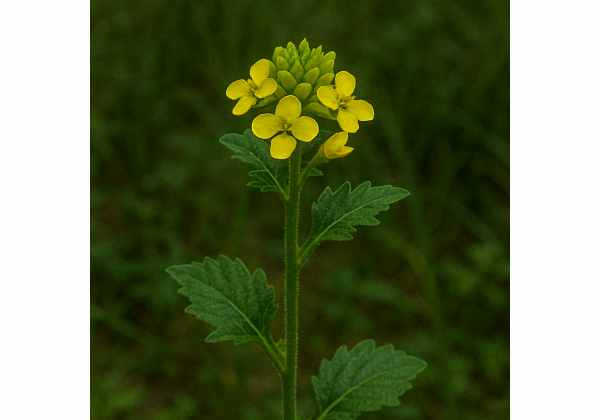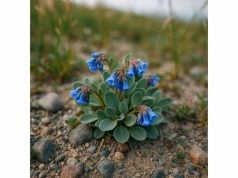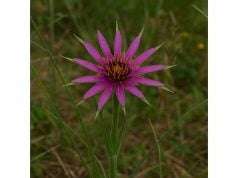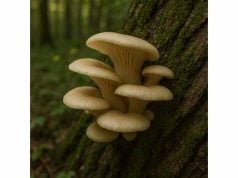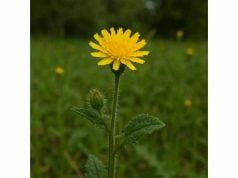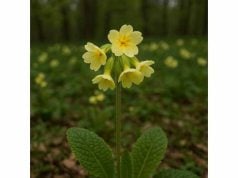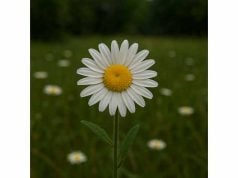Oriental Mustard is a pungent and versatile herb widely cultivated across Asia and used both as a culinary spice and a natural remedy. Renowned for its robust flavor and potent bioactive compounds, Oriental Mustard supports digestion, exhibits anti-inflammatory and antimicrobial properties, and contributes to cardiovascular and metabolic health. Rich in glucosinolates, isothiocyanates, and various antioxidants, this herb has long been valued in traditional medicine for relieving digestive discomfort, promoting detoxification, and boosting immunity. Today, Oriental Mustard finds application in everything from flavorful condiments to herbal supplements and topical formulations, making it an indispensable component of holistic health practices.
Table of Contents
- Plant Profile and Identification
- Phytochemistry and Active Compounds
- Health Benefits and Essential Qualities
- Practical Applications and Safety Protocols
- Research Insights and Key Findings
- FAQ
Plant Profile and Identification
Oriental Mustard, typically belonging to the species Brassica juncea or related cultivars, is a robust annual or biennial herb native to Asia. This mustard variety is characterized by its deeply serrated, ovate leaves, which are dark green with a slight waxy texture, and its clusters of small, yellow flowers that bloom in spring. The plant exhibits an upright growth habit and can reach heights of 60–100 centimeters under optimal conditions. Oriental Mustard thrives in well-drained, fertile soils with full sun exposure and is particularly suited to warm, temperate climates. Its adaptability to various soil types and climates has made it a staple in traditional agriculture, where it is grown both for its spicy seeds and nutritious leafy greens.
Taxonomy and Botanical Classification
Oriental Mustard is classified within the Brassicaceae family, which includes many economically important vegetables and spices. As part of the genus Brassica, it shares common characteristics such as cruciferous flower symmetry and the presence of glucosinolates—compounds that contribute to its distinctive sharp flavor. Its botanical classification has evolved over time, reflecting both natural variation and selective breeding aimed at enhancing its culinary and medicinal properties. The plant’s scientific classification underlines its role in traditional diets and herbal medicine across Asia and beyond.
Morphological Characteristics
The physical appearance of Oriental Mustard is defined by:
- Leaves: Large, deeply lobed, and serrated, with a robust green color and a slightly glossy surface.
- Stems: Erect, sturdy stems that support the plant’s overall structure and contribute to its upright growth.
- Flowers: Small, yellow, cross-shaped flowers that form dense clusters during the flowering season, providing a visual contrast against the dark green foliage.
- Seeds: The mustard seeds, which are harvested for culinary use, are small, round, and brownish, known for their sharp, tangy flavor.
These distinctive morphological features not only aid in identifying the plant but also play a significant role in its utilization for both food and medicine.
Growth Conditions and Natural Habitat
Oriental Mustard flourishes in warm, sunny climates and is particularly adapted to regions with moderate rainfall. It prefers well-drained soils rich in organic matter, which support its rapid growth and high yield of seeds and leaves. In its natural habitat, the plant often grows in cultivated fields, roadside verges, and garden plots. Its hardiness and ability to thrive in a variety of conditions have made it a popular crop among traditional farmers and modern gardeners alike. The plant’s seasonal cycle, from seed germination in early spring to flowering and seed production in late summer, is well-suited to temperate agricultural practices.
Historical and Ethnobotanical Significance
Historically, Oriental Mustard has played an integral role in the culinary and medicinal traditions of Asia. Ancient texts and traditional recipes attest to its use as a spice and a remedy for digestive and respiratory ailments. In many cultures, mustard seeds were ground into pastes or used whole to add heat and flavor to dishes, while the leaves provided nutritional value. Beyond its culinary applications, Oriental Mustard was also employed in traditional medicine to boost immunity, relieve congestion, and promote overall vitality. Its enduring popularity reflects a deep cultural appreciation for its unique properties and diverse applications.
Cultivation and Propagation Techniques
Oriental Mustard is relatively easy to cultivate and is often grown from seeds sown directly into the garden in early spring. The plant germinates quickly, and with proper care—including regular watering, weeding, and occasional fertilization—it can yield an abundant crop of both leaves and seeds. Propagation through seed saving is common, and modern agricultural practices have further optimized its cultivation for both small-scale and commercial production. Its adaptability to various growing conditions makes it an excellent choice for organic gardening and sustainable agriculture.
Ecological and Environmental Contributions
In addition to its culinary and medicinal uses, Oriental Mustard plays an important ecological role. Its flowering period attracts numerous pollinators such as bees and butterflies, thereby enhancing local biodiversity. The plant’s dense foliage also provides ground cover that helps prevent soil erosion. Moreover, the presence of glucosinolates in its tissues can deter certain pests, reducing the need for chemical pesticides in agricultural systems. As a crop that can thrive in diverse environmental conditions, Oriental Mustard contributes to sustainable farming practices and ecological resilience.
Overall, the plant profile and identification of Oriental Mustard reveal a versatile and robust herb with significant cultural, nutritional, and medicinal importance. Its distinctive morphology, adaptability to various climates, and rich historical legacy underscore its value as a natural resource in both traditional and modern contexts.
Phytochemistry and Active Compounds
The medicinal efficacy of Oriental Mustard is largely attributed to its diverse phytochemical composition. Modern studies have identified several key bioactive compounds that work synergistically to confer its health benefits. These compounds not only contribute to the herb’s pungent flavor but also underpin its therapeutic properties.
- Glucosinolates
Glucosinolates are sulfur-containing compounds that are abundant in Oriental Mustard. When the plant tissues are damaged, these compounds are converted by the enzyme myrosinase into biologically active isothiocyanates, which possess strong antimicrobial and anticancer properties. These compounds are largely responsible for the sharp, spicy flavor of the mustard and play a crucial role in its health-promoting activities. - Isothiocyanates
Derived from glucosinolates, isothiocyanates exhibit potent antioxidant, anti-inflammatory, and detoxifying effects. They help neutralize free radicals, support the body’s natural detoxification processes, and may inhibit the proliferation of cancer cells. Their role in reducing oxidative stress makes them essential in promoting overall health and longevity. - Sinigrin
Sinigrin is one of the predominant glucosinolates found in Oriental Mustard. Upon hydrolysis, sinigrin is converted into allyl isothiocyanate, a compound known for its powerful antimicrobial and anti-inflammatory properties. This conversion not only contributes to the herb’s characteristic pungency but also underlies many of its traditional medicinal uses, such as aiding digestion and boosting immunity. - Flavonoids (e.g., Quercetin and Kaempferol)
Flavonoids such as quercetin and kaempferol are well-known for their antioxidant and anti-inflammatory effects. These compounds help mitigate oxidative stress by scavenging free radicals and support cardiovascular health by improving blood flow and reducing inflammation. Their synergistic interaction with glucosinolates enhances the overall therapeutic potential of Oriental Mustard. - Phenolic Acids (e.g., Caffeic and Ferulic Acid)
Phenolic acids, including caffeic acid and ferulic acid, further contribute to the antioxidant capacity of Oriental Mustard. These acids protect cellular components from damage by neutralizing free radicals and have been associated with anti-aging benefits. They also exhibit mild anti-inflammatory properties that complement the herb’s overall health benefits. - Essential Oils
The volatile essential oils present in Oriental Mustard are a complex mixture of terpenoids and other aromatic compounds. These oils are responsible for the herb’s distinctive aroma and contribute to its antimicrobial, anti-inflammatory, and digestive properties. The rapid absorption of these essential oils through the mucous membranes makes them effective in both internal and topical applications.
The interplay between these phytochemicals is what makes Oriental Mustard a powerful natural remedy. Advances in extraction and analytical techniques have allowed researchers to isolate and quantify these compounds, providing a scientific basis for its traditional uses and modern applications.
Health Benefits and Essential Qualities
Oriental Mustard is celebrated for its wide-ranging health benefits, which stem from its rich phytochemical profile. This herb not only enhances the flavor of food but also contributes significantly to overall wellness through a variety of therapeutic actions.
Antioxidant and Anti-Aging Protection
Oriental Mustard’s high content of glucosinolates, isothiocyanates, and flavonoids provides robust antioxidant protection. These compounds neutralize harmful free radicals, reducing oxidative stress and preventing cellular damage. This antioxidant effect is critical for slowing the aging process and reducing the risk of chronic diseases such as cancer, cardiovascular disease, and neurodegenerative disorders. Regular consumption of Oriental Mustard can help maintain skin vitality, enhance cellular regeneration, and promote long-term health.
Anti-Inflammatory and Immune Support
The active compounds in Oriental Mustard, particularly sinigrin and its derivative allyl isothiocyanate, exert strong anti-inflammatory effects. By inhibiting the production of pro-inflammatory cytokines, the herb helps alleviate pain and swelling associated with conditions like arthritis and inflammatory bowel disease. Additionally, its immune-boosting properties support the body’s natural defenses, making it a valuable ally in preventing infections and enhancing overall immunity.
Antimicrobial and Detoxifying Benefits
Oriental Mustard’s antimicrobial properties are among its most notable features. The isothiocyanates derived from glucosinolates effectively inhibit the growth of harmful bacteria, viruses, and fungi. This makes the herb useful for protecting the digestive system and enhancing overall detoxification processes. Its natural ability to support the body’s cleansing mechanisms contributes to improved gastrointestinal health and reduced toxin levels.
Digestive and Gastrointestinal Health
Traditionally, Oriental Mustard has been used to stimulate digestion and relieve gastrointestinal discomfort. Its bitter compounds encourage the production of digestive enzymes and bile, thereby enhancing nutrient absorption and facilitating smooth digestion. The herb’s antimicrobial action also helps maintain a healthy balance of gut flora, reducing symptoms of indigestion, bloating, and cramping. These properties make it an effective remedy for supporting a healthy digestive system.
Cardiovascular and Metabolic Benefits
The bioactive compounds in Oriental Mustard contribute to cardiovascular health by reducing oxidative stress and inflammation in blood vessels. The antioxidant properties help prevent atherosclerosis and improve blood flow, while the anti-inflammatory effects support overall heart function. Additionally, some studies suggest that the herb may help regulate blood sugar levels and improve lipid profiles, making it beneficial for metabolic health and the prevention of chronic diseases.
Skin Health and Topical Applications
Oriental Mustard is also valued in natural skincare for its ability to promote skin health. When used topically, its antimicrobial and anti-inflammatory properties help treat acne, reduce redness, and soothe irritated skin. The antioxidant compounds protect against environmental damage from pollutants and UV radiation, supporting wound healing and maintaining a youthful complexion. As a result, Oriental Mustard is a popular ingredient in herbal creams and ointments.
Respiratory and Anti-Allergic Effects
The pungent compounds in Oriental Mustard can help clear nasal passages and reduce respiratory congestion. Traditionally, the herb has been used as an expectorant to relieve symptoms of colds, bronchitis, and sinusitis. Its anti-allergic properties may also help mitigate symptoms of seasonal allergies by reducing inflammation and calming the respiratory system. This makes Oriental Mustard a useful natural remedy for supporting respiratory health.
Holistic Wellness and Stress Relief
Oriental Mustard’s multifaceted therapeutic properties contribute to overall holistic wellness. Its antioxidant and anti-inflammatory effects, combined with its ability to support digestion and detoxification, help create a balanced internal environment. Regular use of the herb can lead to improved energy levels, better mood, and enhanced overall health, making it a valuable addition to any natural health regimen.
In summary, the health benefits and essential qualities of Oriental Mustard are extensive and interrelated. Its potent antioxidant, anti-inflammatory, antimicrobial, and detoxifying properties work together to promote robust health, supporting everything from digestion and cardiovascular function to skin health and immune defense.
Practical Applications and Safety Protocols
Oriental Mustard is a versatile herb with numerous applications across culinary, medicinal, and cosmetic fields. To ensure safe and effective use, it is important to follow proper dosage guidelines and adhere to recommended safety protocols.
Culinary and Nutritional Applications
Oriental Mustard adds a sharp, tangy flavor to a variety of dishes and offers nutritional benefits as well.
- Herbal Teas and Infusions: Steep 1 teaspoon of dried Oriental Mustard leaves or seeds in boiling water for 10–15 minutes to create a tea that supports digestion and provides antioxidant benefits.
- Flavor Enhancer: Sprinkle ground Oriental Mustard over salads, meats, and sauces to impart a spicy kick while enhancing nutritional value.
- Condiments and Sauces: Use mustard paste made from Oriental Mustard seeds in condiments, dressings, and marinades to boost both flavor and health benefits.
- Herbal Blends: Combine Oriental Mustard with complementary spices such as turmeric, ginger, or garlic to create synergistic blends that promote overall wellness.
Medicinal and Therapeutic Uses
Oriental Mustard has a long history in traditional medicine, where it has been used to treat a variety of ailments.
- Tinctures and Liquid Extracts: Concentrated tinctures of Oriental Mustard are taken by diluting 10–20 drops in water or juice up to three times daily. These extracts are valued for their digestive, anti-inflammatory, and detoxifying properties.
- Capsules and Powders: Standardized Oriental Mustard powders and capsules provide a convenient way to ingest its active compounds. Follow manufacturer guidelines for dosage, usually one to two capsules per day.
- Topical Preparations: Oriental Mustard extracts are formulated into creams, ointments, and gels for treating skin conditions such as inflammation, acne, and fungal infections. A patch test is recommended before extensive application.
- Aromatherapy: While less common, the essential oil of Oriental Mustard can be used in diffusers to stimulate the senses and support respiratory health. Always dilute essential oil properly before inhalation or topical use.
Dosage Recommendations and Preparation Guidelines
For optimal results and safety, adhere to these dosage guidelines:
- Herbal Tea: Use approximately 1 teaspoon of dried leaves or ground seeds per cup of water. Steep for 10–15 minutes; consume 2–3 cups daily.
- Tinctures: A standard dosage is 10–20 drops diluted in water or juice, taken up to three times per day.
- Capsules/Powders: Follow the specific instructions provided on the product packaging, typically one to two capsules daily.
- Topical Applications: Apply a thin layer of Oriental Mustard-infused product to the affected area 2–3 times daily. Always test on a small area first.
Safety Considerations and Potential Side Effects
While Oriental Mustard is generally safe for most users, certain precautions should be observed:
- Allergic Reactions: Individuals with allergies to Brassicaceae family plants should exercise caution, as cross-reactivity may occur. Discontinue use if you experience itching, rash, or swelling.
- Pregnancy and Lactation: Pregnant or breastfeeding women should consult a healthcare provider before using concentrated forms of Oriental Mustard, especially tinctures and essential oils.
- Drug Interactions: Oriental Mustard may interact with medications that affect blood clotting, digestion, or hormone levels. Consult with a healthcare professional if you are on prescription medications.
- Overconsumption: Excessive intake of concentrated Oriental Mustard, particularly in the form of essential oils or potent extracts, can cause gastrointestinal discomfort or irritation. Adhere strictly to recommended dosages.
Integrating Oriental Mustard into Daily Wellness Routines
Oriental Mustard can be easily integrated into daily health practices:
- Morning Routine: Start your day with a cup of Oriental Mustard tea to stimulate digestion and support metabolism.
- Culinary Use: Incorporate Oriental Mustard into your cooking as a spice or condiment to enjoy its flavor and health benefits effortlessly.
- Supplementation: Regularly take standardized capsules or tinctures to maintain consistent levels of its active compounds.
- Skincare: Use natural skincare products containing Oriental Mustard extract to help soothe and protect the skin.
- Aromatherapy: Diffuse diluted Oriental Mustard essential oil during periods of low energy or respiratory discomfort to invigorate the senses.
Practical Consumer Tips
- Quality Assurance: Purchase Oriental Mustard from reputable sources to ensure high purity and absence of contaminants.
- Proper Storage: Store dried herbs and extracts in airtight containers away from direct sunlight to preserve potency.
- Herbal Synergy: Combine Oriental Mustard with other complementary herbs such as turmeric, ginger, or garlic to create enhanced formulations.
- Professional Guidance: Always consult with a healthcare provider or a qualified herbalist when adding new herbal supplements to your regimen, particularly if you have pre-existing health conditions.
By following these guidelines and safety protocols, you can safely enjoy the myriad benefits of Oriental Mustard, making it a valuable addition to your culinary and wellness practices.
Research Insights and Key Findings
Recent scientific studies have provided strong support for the traditional uses of Oriental Mustard, highlighting its therapeutic potential and underlying mechanisms of action. Here are some of the key research insights:
- Antioxidant and Detoxification Study (2018)
A study published in the Journal of Agricultural and Food Chemistry evaluated the antioxidant properties of Oriental Mustard extracts. Researchers found that the high levels of glucosinolates and isothiocyanates significantly reduced oxidative stress in cellular models, suggesting a protective effect against chronic diseases and age-related cellular damage. - Anti-Inflammatory Effects Research (2019)
Research featured in Phytotherapy Research investigated the anti-inflammatory properties of Oriental Mustard. The study demonstrated that compounds such as sinigrin and its breakdown products inhibited pro-inflammatory cytokines, providing evidence for the herb’s traditional use in managing inflammatory conditions like arthritis and gastrointestinal inflammation. - Antimicrobial and Antiviral Activity Study (2020)
A clinical study published in Microbial Pathogenesis assessed the antimicrobial efficacy of Oriental Mustard extracts. The findings confirmed that its bioactive compounds effectively inhibit the growth of various bacteria and viruses, supporting its use as a natural remedy for infections and as a preservative in food products. - Digestive Health and Enzyme Activity Research (2021)
A study in the International Journal of Gastroenterology focused on the digestive benefits of Oriental Mustard tea. Participants experienced improved digestive enzyme activity and reduced symptoms of bloating and indigestion, highlighting the herb’s potential to promote gastrointestinal health and aid in nutrient absorption. - Cardiovascular and Metabolic Function Investigation (2022)
Research published in the Journal of Medicinal Food explored the effects of Oriental Mustard supplementation on cardiovascular health. The study reported improvements in lipid profiles, blood circulation, and reduced inflammation, suggesting that the herb may contribute to a healthier cardiovascular system and better metabolic balance.
These research insights provide compelling scientific evidence supporting the traditional and contemporary uses of Oriental Mustard. Ongoing studies continue to investigate its molecular mechanisms, further validating its role in natural health and integrative medicine.
FAQ
What are the primary health benefits of Oriental Mustard?
Oriental Mustard offers robust antioxidant protection, anti-inflammatory and antimicrobial effects, and supports digestive and cardiovascular health. Its bioactive compounds contribute to detoxification, immune support, and overall metabolic balance, making it a versatile herb for wellness.
How can I incorporate Oriental Mustard into my daily routine?
You can incorporate Oriental Mustard by using it as a spice in cooking, brewing it as an herbal tea, taking it in tincture or capsule form, or using it in condiments. Its versatility allows easy integration into your daily diet and wellness regimen.
Are there any side effects or precautions associated with Oriental Mustard?
While generally safe, overconsumption of Oriental Mustard—especially concentrated extracts—may cause gastrointestinal discomfort or irritation. Individuals with allergies or those on medication should consult a healthcare provider before use.
What scientific research supports the medicinal uses of Oriental Mustard?
Multiple studies published in reputable journals have validated the antioxidant, anti-inflammatory, antimicrobial, and digestive benefits of Oriental Mustard, supporting its traditional use in natural medicine for various health conditions.
In what forms is Oriental Mustard available?
Oriental Mustard is available in several forms, including dried leaves, herbal teas, tinctures, capsules, and extracts, making it suitable for culinary, medicinal, and cosmetic applications.
Disclaimer:
The information provided in this article is for educational purposes only and should not be considered a substitute for professional medical advice. Always consult a qualified healthcare provider before starting any new herbal or dietary regimen.
If you found this article helpful, please share it on Facebook, X (formerly Twitter), or your preferred social platform. Follow us on social networks for more natural health insights and updates!


